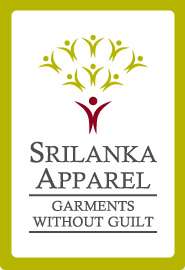Out of Sri Lanka, one of the major manufacturing centers for Western apparel, comes Garments Without Guilt, a campaign launched by the country's clothing industry that focuses on ethically-made products free of child labor and sweatshop conditions. And now, expanding on the meaning of "ethical", three of Sri Lanka's largest apparel manufacturers have launched eco-factories that use sustainable, environmentally-friendly practices.
Garments Without Guilt (GWG) teaches that to be truly concerned about workers means showing an interest in the sustainability of their natural environment. So in addition to corporate social responsibility (CSR) projects to improve the water and general living conditions of the workers, Sri Lanka Apparel's member manufacturers are joining with large retail giants such as Marks & Spencer and the GAP, to ease the factories' environmental impact.
Brandix, one of Sri Lanka's largest apparel exporters, converted a thirty-year-old factory into a modernized hi-tech eco-friendly plant. Since the conversion, the "Green Plant" has been able to reduce the company's carbon footprint by 77%–from 2,076 metric tons to 484 metric tons. They've committed to join with Marks & Spencer's "Plan A" and have developed a five-year eco-plan to further reduce their carbon footprint by 35% by the year 2012–M&S's Plan ‘A' target date to neutralize the company's carbon emissions.
Brandix is also committed to preserving water as one of their major initiatives, and for that reason, the company has built a rainwater harvesting tank with a capacity of 100,000 litres.
M&S CEO, Sir Stuart Rose, recognized Brandix as a valuable part of their production and offered his company's support to this eco-factory. "Not only has it reduced its carbon footprint since its renovation, it has also reduced its energy usage, uses less water and no longer sends waste to landfill. It will also continue to produce great quality clothing."
The Green Plant, located in the town of Seeduwa, surpasses all standards stipulated by Leadership in Energy and Environmental Design (LEED) from the Green Building Rating System created by the U.S. Green Building Council (USGBC). The Group is also the recipient of the prestigious international Green Apple award for the best in environmental practices.
Another of Sri Lanka's largest exporters, MAS Intimates, has begun building a new eco-friendly plant in the town of Thulhiriya which will manufacture lingerie for UK-based Marks and Spencer.
Their $7 million investment is just another integral part of Marks & Spencer's 200 million Sterling Pound "Plan A" scheme to make sure that all of their operations worldwide use sustainable sources and processes to help them meet their goal of being completely carbon neutral by 2012.
Meanwhile, garment manufacturer Hirdaramani Group, has been building a ‘green' factory as well, and is also gradually making all of the group's existing factories more environmentally friendly.
Their first ‘green' factory, with an investment of around US$ 5 million, will be called C.K.T. Apparel Pvt. Ltd. and was launched with a celebratory ‘Green Week' which included a tree planting campaign. Trees were planted across the factory's campus, and another 1000 plants were distributed to factory members to be grown in their homes.
These green factories come in the wake of the global awakening about climate change, with more and more consumers calling for "green garments" and eco-friendly goods. Studies have shown that people interested in ethical garments are also concerned about the environment. These customers are sure to be satisfied that garments manufactured by these factories will include tags that show they were made in a carbon-neutral factory.
(Thanks to Steve G. for submitting the story idea!)










Be the first to comment